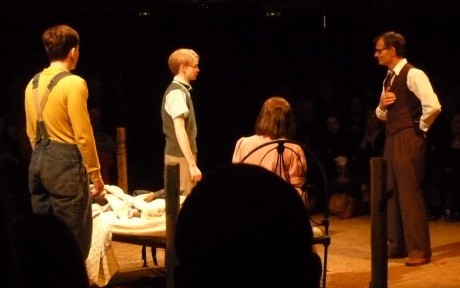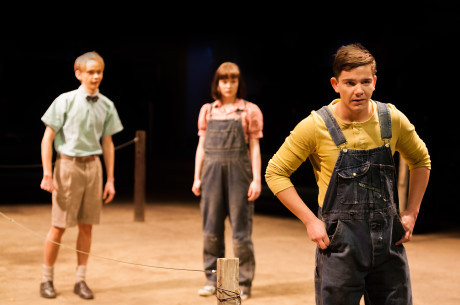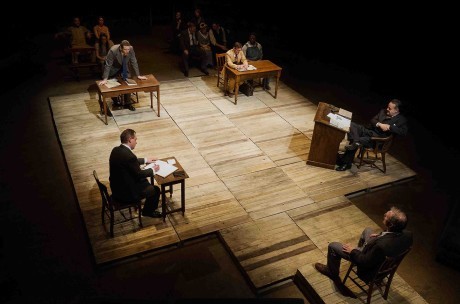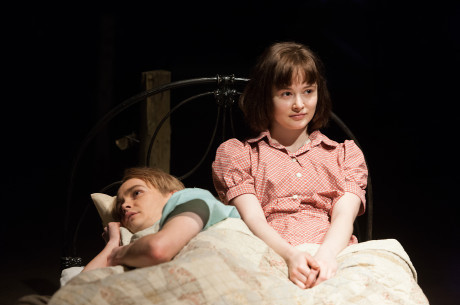A young woman walks on stage, which is bare but for a layer of sand and a single, standing microphone. She is holding a book. In her baggy, oversized coat, she looks small and uncertain, but her voice is strong. “To Kill A Mockingbird, by Harper Lee,” she says and begins to read. Then, after a few lines, she pauses for a moment and turns slightly, inspecting the audience. Her familiar English accent now morphs into something else, taking on the lilting intonations of the Deep South. Suddenly the stage is a flurry of activity as a host of men and women in simple 1930s dress stream through the doorways, setting down flower boxes and putting up railings.

The narrator, too, performs a quick change, doffing her coat and putting on a pair of worn dungarees. Within seconds, she is swinging on a rubber tyre with all the irrepressible energy and joy of a young child whose summers seem to last forever.
From one of the doorways, a small band of musicians enter. They wear straw hats and faded checked shirts, strumming and twanging on simple guitars and singing in tri-part harmony, their clear, confident voices filling the round.
It’s nothing less than the magic of theatre: an illusion so wonderfully fabricated, so compelling, so consuming that, for the next two hours, the ordinary reality of Manchester is effortlessly replaced by the heat, dust and simmering tensions of Maycomb – a fictional small-town in the southern U.S. state of Alabama.
The novel from which the play is adapted is one of the most popular and influential books in the English language. Since its publication in 1960 it has never been out of print and has sold over 30 million copies. It regularly features on the GCSE English Literature curriculum, and in 2006, British librarians proclaimed it a book which “every adult should read before they die”.
It’s not difficult to see why. Harper Lee’s story of three years in the Finch family, told through the eyes of six year old Scout, is humorous, warm, powerful and provocative. It covers such hefty themes as racial inequality, injustice, prejudice, economic depression and rape, but is tempered by a lightness of touch which does not forget to celebrate the joy and innocence of childhood, the strong bonds of family, and human kinship.

In the beginning, we watch as Scout, Jem and their childhood friend Dill spend most of their time playing out in the yard and concocting tall tales about local boogeyman “Boo” Radley, a reclusive neighbour who proves to be a continual source of fascination and terror.
For the most part, the children are shielded from the uglier aspects of the town in which they live – the thread of racial intolerance and hatred which runs beneath the surface of their supposedly genteel and civilised society. But when Atticus Finch is appointed by the court to defend Tom Robinson, a young black man accused of raping a nineteen year old white girl, their lives are changed forever.
Christopher Sergel’s adaptation is both a brilliant piece of theatre and a masterful adaptation of Harper Lee’s best-selling novel. The staging is frequently ingenious in its inventiveness and simplicity – entire seasons, for instance, are communicated by the small but magical touch of red maple leaves, white paper snow, or a storm shower descending from the central rafters. Later on, the appearance of four or five slowly rotating ceiling fans is effective shorthand for the oppressive heat of the courtroom, and each musical interlude reinforces the historical small-town setting.

The cast, meanwhile, is uniformly excellent. Particular praise must go to Shannon Tarbet, whose delightfully spirited Scout is the play’s impetuous, yet pure, beating heart – though she easily convinces as a headstrong young girl, prone to lead with her fists, she also deftly demonstrates a depth of emotional and moral intelligence which is such an integral part of Scout’s character.

Standouts, too, are Scarlett Brookes’ sickly, simpering Mayella Ewell, who manages to draw the audience’s pity and wrath almost simultaneously, and Okezie Morro’s Tom Robinson, whose anguished courtroom testimony is both deeply moving and gut-wrenchingly tragic.
Though Harper Lee was born in 1926, the world in which she grew up is not so different to the one we live in today. Injustice and prejudice still rear their ugly heads; ignorance and small-mindedness sometimes cloud rationality and compassion. Lee’s novel and this production remind us that there will always be those who will stand up for justice and tolerance – those who understand that the world is not simply black and white, and that sometimes the best way to understand a person is to consider things from their point of view.
It’s a worthy message – still relevant – and well worth supporting.
By Alaka Prodhan (@EchoingBronze)
Photograph 1 by Alaka Prodhan, photographs 2-4 by Jonathan Keenan.
To Kill A Mockingbird runs at the Royal Exchange Theatre until 30th March 2013. For more information, including how to book tickets, visit the website.
The Royal Exchange Theatre, St Ann’s Square, Manchester, M2 7DH





